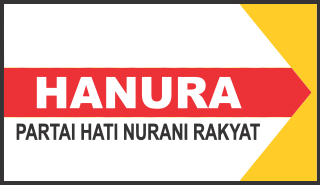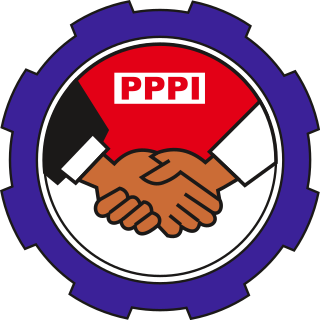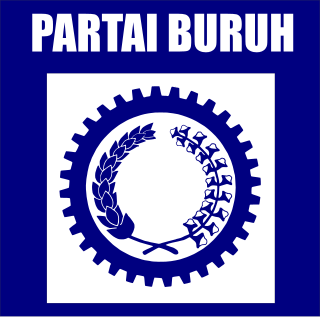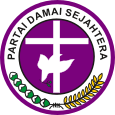
The Crescent Star Party is a conservative political party in Indonesia based on Islam
The Concern for the Nation Functional Party is a right-wing reactionary political party in Indonesia. The party was established by former members of the Golkar Party who were dissatisfied with Golkar's abandonment of former president Suharto including former minister Hartono and Suharto's daughter Siti Hardiyanti Rukmana. Suharto himself approved the party name.
The Democratic Nationhood Party was a political party in Indonesia. It was established in 2002 as the United Democratic Nationhood Party by a group of intellectuals including Ryaas Rasyid and Andi Mallarangeng, formerly president Susilo Bambang Yudhoyono's spokesman, who were disatissfied with the progress of the reform movement following the Fall of Suharto.

The Indonesian Democratic Vanguard Party was a political party in Indonesia. It was a continuation of the Indonesian Democratic Party (PDI), one of the two state-approved parties during the New Order. After the PDI failed to achieve enough votes in the 1999 legislative elections to qualify for the 2004 elections, it changed its name to the Indonesian Democratic Vanguard Party. In 2004 it won one seat. The party contested the 2009 legislative election, but won only 0.13 percent of the vote, less than the 2.5 percent electoral threshold, thereby losing its only seat in the People's Representative Council. Following its poor result in the 2009 vote, the party joined nine other smaller parties to form the National Unity Party. The party also attempted to contest the 2014 elections, but failed to fulfill the criteria set by the General Elections Commission, and along with nine other parties who also failed to qualify, decided to merge into the People's Conscience Party (Hanura).

The People's Conscience Party, better known by its abbreviation, Hanura, is a political party in Indonesia. It was established following a meeting in Jakarta on 13–14 December 2006 and first headed by former Indonesian National Armed Forces commander Wiranto. The party lost its seats in the People's Representative Council after a poor performance in the 2019 general election.

The National Front Party is a political party in Indonesia. It was founded by Vence Rumangkang, former member of the Democratic Party advisory board.

The Indonesian Workers and Employers Party is a political party in Indonesia. The party aims to integrate the struggle of Indonesian employers and workers. It contested the 2009 elections, but won only 0.7 percent of the vote, less than the 2.5 percent electoral threshold, meaning it was awarded no seats in the People's Representative Council.

The National People's Concern Party was a political party in Indonesia, headed by Amelia Achmad Yani, daughter of General Ahmad Yani. It contested the 2009 elections, but won only 1.2 percent of the vote, less than the 2.5 percent electoral threshold, so gained no seats in the People's Representative Council. The party intended to contest the 2014 elections, but failed to fulfil the ctteria set by the General Elections Commission, and along with nine other parties who also failed to qualify, decided to merge into the People's Conscience Party (Hanura).
The National Sun Party was a political party in Indonesia. The party contested only in the 2009 elections.

The Prosperous Indonesia Party was a political party in Indonesia. It contested the 2009 elections, but won only 0.3 percent of the vote, less than the 2.5 percent electoral threshold, meaning it was awarded no seats in the People's Representative Council. Following its poor result in the 2009 vote, the party joined nine other smaller parties to form the National Unity Party. The party also attempted to contest the 2014 elections, but failed to fulfill the criteria set by the General Elections Commission, and along with nine other parties who also failed to qualify, decided to merge into the People's Conscience Party (Hanura).
The Indonesian Democratic Party of Devotion was a political party in Indonesia. It was one of two Christian parties contesting the 2009 elections.
The Sovereignty Party was a political party in Indonesia and a contestant in the 2009 elections.

The Indonesian Youth Party was a political party in Indonesia. It contested the 2009 elections with a platform of motivating young people to participate in national development. The party won only 0.4 percent of the vote, less than the 2.5 percent electoral threshold, meaning it was awarded no seats in the People's Representative Council. Following its poor result in the 2009 vote, the party joined nine other smaller parties to form the National Unity Party. The party also attempted to contest the 2014 elections, but failed to fulfill the criteria set by the General Elections Commission, and along with nine other parties who also failed to qualify, decided to merge into the People's Conscience Party (Hanura).

The Archipelago Republic Party (Indonesian: Partai Republika Nusantara) was a political party in Indonesia established in 2007. It contested the 2009 election on a platform of simplification of the bureaucracy, reforms to education and prioritization of maritime development. However, it won only 0.6 percent of the vote, less than the 2.5 percent electoral threshold, meaning it was awarded no seats in the People's Representative Council. The party intended to contest the 2014 elections, but failed to fulfill the criteria set by the General Elections Commission, and along with nine other parties who also failed to qualify, decided to merge into the People's Conscience Party (Hanura).

The Regional Unity Party was a political party in Indonesia. The party was founded as a result of the reforms to the People's Consultative Assembly, Indonesia's supreme law-making body which used to consist of the elected People's Representative Council plus members appointed from the regions and functional groups. When these unelected members were removed in 1999 after the first democratic elections following the fall of Suharto, several regional representatives' led by Oesman Sapta, tried to reestablish the Regional Representatives Faction. The members of this faction took the view that the elected Regional Representatives Council, which replaced the unelected members of the People's Consultative Assembly, would not be effective as it was too small. They therefore decided to establish a political party to represent the interests of the regions.
The New Indonesia National Sovereignty Party is a political party in Indonesia. It was established as the New Indonesia Alliance Party by the economist Dr. Sjahrir and was initially made up of university students, middle-class people and the leaders of several political parties. In a speech on 23 September 2002, Sjahrir said he wanted to establish the party because he was frustrated and angry with the political situation dominated by corruption and the craving for power.
The Indonesian Nahdlatul Community Party is a minor conservative political party in Indonesia.
The Indonesian Unity Party was a political party in Indonesia.

The Labour Party was a political party in Indonesia. It had its origins in the Indonesian Prosperous Laborers organization (SBSI), which in 1993 threw its support behind the Indonesian Democratic Party (PDI) as a vehicle for its political aspirations. When the PDI split in 1996, it allied itself with the breakaway faction led by Megawati Sukarnoputri, which led to it coming under pressure from the New Order government of President Suharto. On 30 July 1996, SBSI chairman Muchtar Pakpahan was detained on subversion charges. Following the fall of Suharto in 1998, the SBSI became disillusions with Megawati's now renamed Indonesian Democratic Party – Struggle and decided to establish its own party, the National Labour Party. After the failure in 1999 election, the party changed its name to Social Democrat Labour Party. The party stood in the 2004 Indonesian legislative election, but won only 0.6 percent of the vote and no legislative seats. Party chairman However, the party has 12 representatives in provincial assemblies. The party subsequently changed its name to the Labour Party.

Legislative elections were held in Indonesia on 9 April 2014 to elect 136 members of the Regional Representative Council (DPD), 560 members of the People's Representative Council (DPR) and members of regional assemblies at the provincial and regency/municipality level. For eligible voters residing outside Indonesia, elections were held on 5 or 6 April 2014 based on the decision of the electoral commission of each different countries. The 2014 Lampung gubernatorial election was held concurrently.












